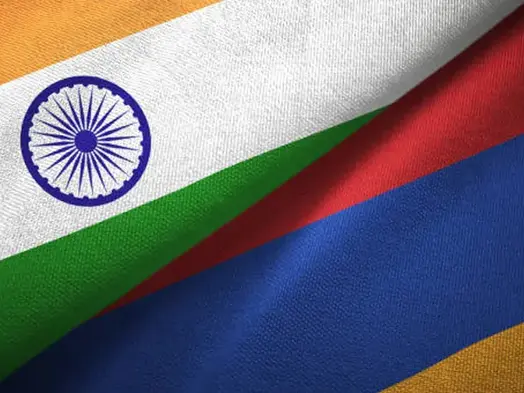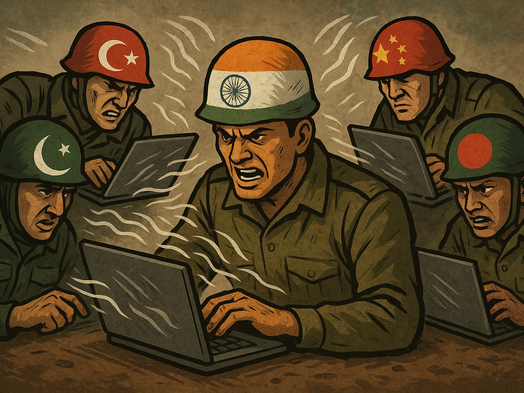top of page


00:53

00:53

00:51

00:42

00:53

29:19

00:55

00:49


Mahrang Baloch: The voice Pakistan and China fear most
In an age where democracies falter and authoritarian regimes form alliances of convenience, the global defence of human rights is no...


How Erdogan’s Turkey jockeys its way to profits in guise of Islamism
From fishing in troubled waters of Syria to doing business in both war and peace between Russia and Ukraine, and standing by “brotherly”...


India-Armenia defense ties are shaping a new geopolitical equation
In a world increasingly defined by shifting alliances and strategic recalibrations, the burgeoning defense relationship between India and...


Changing India’s neighbourhood gaze using two Ts
In this essay I use two examples from two extremities - Tamil Nadu and Tripura - to try and examine how India can significantly enhance its regional influence and unlock substantial economic possibilities by strategically leveraging the unique strengths and geographical advantages of its federal states.


Bangladesh under Yunus: A revolution drowning its children
When the Monsoon Revolution forced Sheikh Hasina from power, many hoped the storm would bring democratic renewal. Instead, it has begun...


Why the US and Iran may not arrive at a nuclear deal
Iran and the US recently concluded the fifth round of negotiations, mediated by Oman, in Rome and the US President Donald Trump hinted at...


No match for India: How Pakistan’s military delusions were shattered by a reality check
In the volatile landscape of South Asian geopolitics, the balance of military power between India and Pakistan has often drawn...


Understanding Pakistan’s reliance on Chinese debt
As of late 2024, the World Bank identified China as Pakistan's largest bilateral creditor, holding approximately $29 billion in loans, constituting about 22% of Pakistan's total external debt. Pakistan sustains its economic needs on external financial assistance, how long will the country stay in this debt trap?


The 're-hyphenation' myth
While arch-adversaries in a military conflict, the massive gap in economic size, geopolitical heft, military budget ensures that India...


India’s generosity, Turkey’s betrayal: Erdogan’s shameful turn against a longstanding friend
For decades, India has shown nothing but goodwill towards the Turkish people — from humanitarian assistance in moments of crisis to...


Why India-Turkey ties are in crisis
The recent conflict has also brought forth Pakistan’s relationship with Turkey and the latter’s consistent support to the defence...


Banning the Awami League: A step backwards for Bangladesh’s democracy
In a moment of stunning political rupture, Bangladesh’s interim government under Mohammad Yunus has officially banned the Awami League...


Strategic disinformation: The role of Turkey, China, and Bangladesh in Pakistan’s information warfare against India during Operation Sindoor
Abstract The recent India-Pakistan conflict, known as Operation Sindoor, extended beyond traditional military engagements into the realm...


Evolving Air Defence in South Asia: The Role of the S-400 and Prospects for S-500 Joint Production in India’s Strategic Doctrine
As Pakistan launched airstrikes on Indian territory along the Line of Control (LoC) and the International Border in response to Operation...


Understanding the India-Pakistan War through Peace Theory
India and Pakistan have reached a ceasefire understanding and yet the shadows of the conflict still loom large. The situation of peace between India and Pakistan rests on very unstable grounds, thereby creating conditions for a fragile or a ‘negative peace’. A negative peace exists when there is a cessation of hostile activities on both ends and yet the underlying issues of conflict still persist.


Aakash, the Made in India surface-to-air missile - the star of Operation Sindoor
Aakash surface-to-air missile (SAM) system has emerged as a major success story of indigenous defence manufacturing in India.


The Trump-brokered ceasefire: A litmus test for the Quad and regional stability
The recent U.S.-brokered ceasefire between India and Pakistan, announced by President Donald Trump on 10 May 2025, underscores the...


India and Pakistan: The Elusive Quest for Conventional Deterrence Below the Nuclear Threshold
Why India and Pakistan have failed to find adequate deterrence under the nuclear threshold, and how this causes incessant strife between the two nuclear-armed South Asian neighbours.


Shifting gears: India's changing response to cross-border terrorism
In the dead of the night leading up to May 7th, 2025, India carried out missile strikes in Pakistan to avenge the lives of those killed in the Pahalgam terror attacks. However, a shift in India's doctrine toward counterterrorism operations can be observed. India has made it clear with these precision strikes that any terror attack sponsored by Pakistan would be considered as an act of aggression warranting military action from India.


India must ignore nuclear scaremongering and finish the job
Operation Sindoor should be a turning point — not a blip. In the aftermath of the brutal terrorist attack on Indian holidaymakers in...
bottom of page









